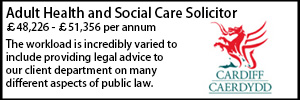More must be done to ensure unpaid carers are “proactively identified” and informed of right to carers’ needs assessment: Public Services Ombudsman for Wales
- Details
Although carers in Wales are legally entitled to a needs assessment if they appear to have needs for support or are likely to do so in the future, only 2.8% of carers across four local authorities in Wales have had their needs assessed, a report by the Public Services Ombudsman for Wales has found.
The report, published last week (31 October), focused on the administration of carers’ needs assessments by four local authorities in Wales – Caerphilly County Borough Council, Ceredigion County Council, Flintshire County Council and Neath Port Talbot Council.
Although some areas of good practice were identified across all four local authorities, the report also highlighted several areas for improvement.
The watchdog’s investigation found that although carers are legally entitled under the Social Services and Well-being (Wales) Act 2014 to a ‘needs assessment’ if they appear to have needs for support or are likely to do so in the future, only 2.8% of the carers in the investigated authorities had had their needs assessed, and only 1.5% had an assessment that led to a support plan.
Between 10% and 12% of the population in the investigated authorities identify as unpaid carers, according to the 2021 Census.
The report made the following recommendations for improvement:
- The early identification of carers, to support them through early intervention and prevention and to avoid them reaching crisis point before they seek assistance – it is important that carers are informed that they have a right to have their needs assessed separately from the person they are caring for if they want a separate assessment;
- The early identification of carers is not only the role of local authorities, health services also have a role to play and there is a need for improved collaboration;
- There is a need for better data collection and use of equality data;
- There is a need for better monitoring of the quality and consistency of carers needs assessments – where a local authority contracts another organisation to complete carer needs assessments on their behalf, they remain responsible for the services and should monitor the contractual arrangements;
- Local authorities must ensure that their staff and those employed by other organisations commissioned to deliver services are trained appropriately on carers rights and how to assess carers needs.
The Public Services Ombudsman for Wales, Michelle Morris, said: “Welsh Government predicts that the percentage of unpaid carers will increase to 16% of the population by 2037. Therefore, there is no doubt that the role of unpaid carers is crucial in supporting social care in Wales.
“I am eager to ensure that carers are recognised and properly informed of their rights. They should be supported in their role through the provision of early prevention and intervention to ensure that their contribution to social care can continue, if they so wish. Caring should not be to the detriment of the carer’s health and wellbeing. Nor should support only be provided when crisis point has already been reached.
“I hope that the learning and recommendations highlighted in my report will be helpful, not only to the four investigated authorities, but to all local authorities in Wales. I encourage local authorities and health boards to reflect on their own role in supporting carers. Doing so will help drive improvements across Wales and ensure that all carers, regardless of where they or the cared-for person lives, have their rights upheld and feel supported to enable them to continue in their, often demanding, caring roles.”
Lottie Winson



















































